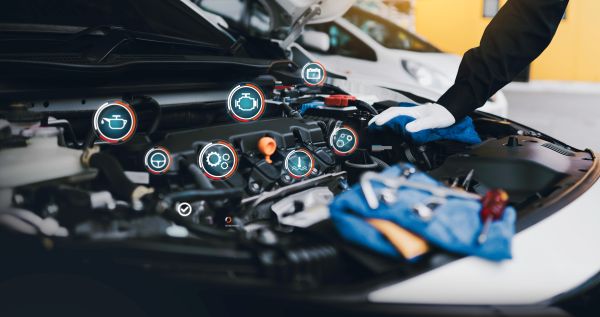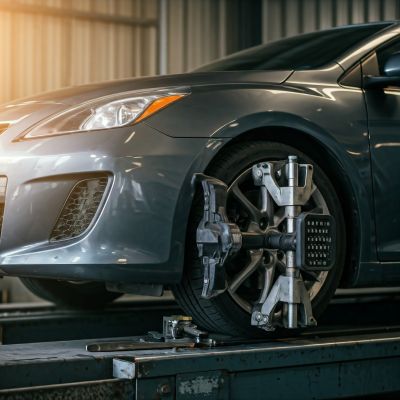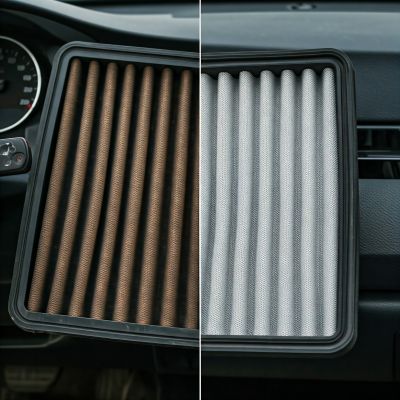
Regular auto maintenance is crucial to ensure your vehicle remains safe, efficient, and reliable. Proactive servicing not only saves you money by preventing expensive repairs but also extends your car’s lifespan. These seven essential auto services form the foundation of proper vehicle care and are must-knows for every car owner.
1. Oil and Filter Changes
- Why It’s Essential: Oil and filter changes keep your engine lubricated, reduce friction, and remove contaminants that can damage internal components. Fresh oil ensures smoother performance and prevents overheating. Regular oil changes are a cornerstone of preventative maintenance.
- Recommended Frequency: Typically every 3,000–7,500 miles, depending on your vehicle’s requirements and whether you use synthetic or conventional oil.
- Key Tips: Always use the manufacturer-recommended oil type and replace the oil filter during each change for optimal performance. This service is an essential part of routine maintenance.

2. Tire Rotations and Alignments
- Why It’s Essential: Regular tire rotations and alignments ensure even tire wear, improve fuel efficiency, and enhance vehicle handling. Misaligned wheels can lead to uneven tire wear and compromise your safety.
- Tire Rotations: Perform every 5,000–7,000 miles to distribute wear evenly across all tires. This extends tire longevity and ensures reliable transportation.
- Wheel Alignments: Schedule whenever you notice pulling to one side, irregular tire wear, or reduced handling.
- Benefits: Prolongs tire lifespan, reduces fuel costs, and ensures a smoother driving experience. Regular tire air pressure checks also enhance performance.
3. Brake Inspections and Maintenance
- Why It’s Essential: Brakes are your vehicle’s most important safety feature. Regular brake inspections catch wear and tear early, preventing brake failure.
- Common Signs of Wear: Look out for squealing, grinding, or reduced brake responsiveness. Issues with brake rotors often indicate the need for immediate brake service.
- Recommended Checks: Inspect brakes at least once a year or immediately if you notice unusual noises or reduced performance.
- What to Include: Brake pad replacements, fluid checks, and rotor inspections to keep your braking system functioning efficiently. This is a vital part of auto repair services.
4. Battery Testing and Replacement
- Why It’s Essential: Your car’s battery powers the electrical systems and ensures the vehicle starts reliably. A weak or failing battery can leave you stranded. Battery maintenance services can help you avoid costly repairs.
- Testing Frequency: Test your battery at least once a year, especially before winter or summer, as extreme temperatures affect performance.
- Signs of a Weak Battery: Slow engine cranking, dim lights, or dashboard warning lights. Replace the battery before it fails entirely with a reliable battery replacement service.
- Key Tip: Always have a maintenance service appointment for regular battery checks.
5. Engine Diagnostics and Tune-Ups
- Why It’s Essential: Modern vehicles rely on complex systems that require regular checks to identify issues. Engine diagnostics help detect problems early, ensuring optimal performance and preventing costly repairs.
- Tools Used: Advanced diagnostic scanners retrieve trouble codes to pinpoint issues. This is a vital part of automotive diagnostics and repair service appointments.
- Common Tune-Up Tasks: Include replacing spark plugs, air filters, and inspecting belts and hoses.
- Recommended Frequency: Follow your manufacturer’s schedule or get a tune-up if performance decreases, such as rough idling or reduced fuel efficiency. Trusting automotive service experts ensures proper knowledge and solutions.
6. Cooling System Maintenance
- Why It’s Essential: The cooling system prevents overheating and protects the engine from damage. Proper maintenance ensures the system functions efficiently and enhances vehicle performance.
- Tasks Involved: Check coolant levels, flush the system as needed, and inspect hoses for wear.
- Recommended Frequency: Flush the coolant every 2–5 years, depending on the vehicle and coolant type.
- Signs of Trouble: Look out for an overheating engine or visible coolant leaks beneath the car. Preventative maintenance can save you from costly repairs.

7. Air Conditioning Service
- Why It’s Essential: A functional air conditioning system ensures comfort during hot weather and prevents system failures that can be expensive to fix. Air conditioner service is especially important in Sun City, Arizona, where summer temperatures can be extreme.
- Recommended Maintenance: Inspect the system annually and recharge refrigerant as needed.
- Common Issues: Weak airflow, unusual odors, or failure to cool the cabin.
- Benefits: Increases system efficiency and prolongs the lifespan of components. This service can be easily arranged during a complete service visit.
Key Takeaways for Car Owners
Maintaining your car through these seven essential services is key to avoiding costly repairs, ensuring safety, and maximizing performance. By staying proactive and addressing issues early, you can enjoy a smoother, stress-free driving experience. Reliable automotive repair and preventative maintenance keep your car road-ready.
Take the next step in maintaining your vehicle by scheduling an appointment with Pete Nelson Automotive by calling us at 623-974-4723. Our skilled mechanics provide excellent customer service and ensure convenient service for all your auto maintenance needs.
FAQs
How often should I get an oil change?
Typically every 3,000–7,500 miles, depending on your vehicle and oil type.
What happens during a tune-up?
A tune-up includes replacing spark plugs, filters, and inspecting belts and hoses to ensure optimal performance.
How can I tell if my brakes need attention?
Listen for squealing or grinding noises, and watch for reduced responsiveness or dashboard warning lights.
